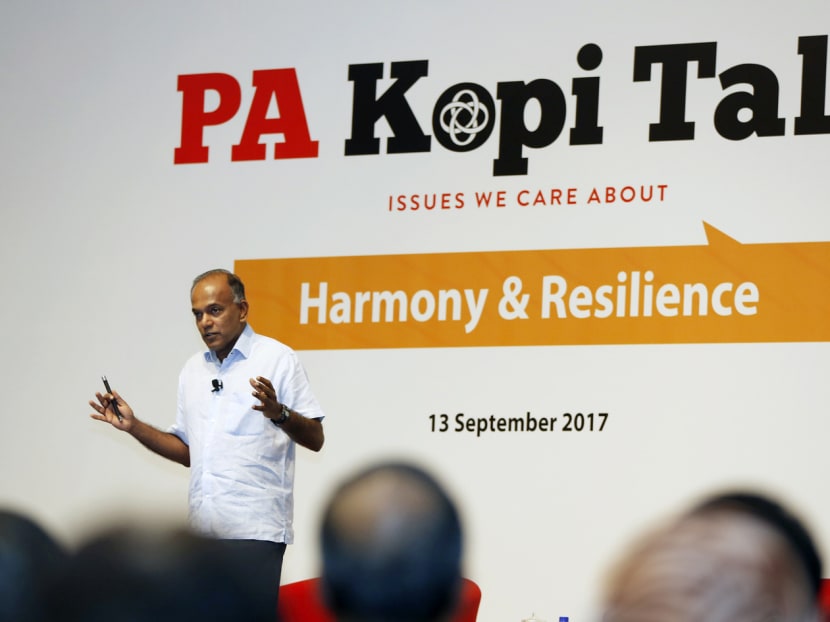Time taken for people to be radicalised has been shortened: Shanmugam
SINGAPORE — While it used to take around 22 months for people to become radicalised, the timeline has been shortened to nine months under the sway of the Islamic State (IS), Home Affairs and Law Minister K Shanmugam said yesterday.

At a People’s Association talk for Malay-Muslim staff members and grassroots leaders, Mr Shanmugam highlighted terrorism and radicalisation as one of three challenges besieging the community. Photo: Raj Nadarajan
SINGAPORE — While it used to take around 22 months for people to become radicalised, the timeline has been shortened to nine months under the sway of the Islamic State (IS), Home Affairs and Law Minister K Shanmugam said yesterday.
Speaking at a People’s Association (PA) talk for Malay-Muslim staff members and grassroots leaders, Mr Shanmugam highlighted terrorism and radicalisation as one of three challenges besieging the community.
“From the time you start to go into it to the time you take a knife to kill someone or throw a bomb at someone, it can be as short as one or two months,” he said. “It makes it very difficult for the security agencies.”
More cases of radicalisation have been flagged in Singapore, he noted. Between 2007 and 2014, there were six restriction orders and five detention orders issued. Since 2015 there have been six restriction orders and 11 detention orders handed out.
The most recent case saw the arrest of a Singaporean man and woman under the Internal Security Act in July. Imran Kassim, 34, managing director of Novo Logistics, was detained for intending to undertake armed violence overseas, while administrative assistant Shakirah Begam Abdul Wahab, 23, was issued a restriction order for initiating and maintaining contact with foreign terrorist fighters.
Under such circumstances, communal tensions have been fanned, said Mr Shanmugam. In June, the construction hoarding of the upcoming Marine Parade MRT Station was vandalised, with the word “terrorist” scrawled across artwork depicting a tudung-clad woman. To tackle these concerns, the Asatizah Recognition Scheme became mandatory in January, requiring Islamic religious teachers to be registered with the Islamic Religious Council of Singapore (Muis).
To inoculate the community against radical ideology, Mr Shanmugam called for greater engagement by Muis, the Religious Rehabilitation Group and other community groups.
The government also takes a firm stand against exclusivist preachers.
In April, an Indian imam was fined S$4,000 and repatriated for making offensive remarks against Jews and Christians. Last month, two foreign Christian preachers who had made offensive comments about people of other religions had their applications to speak in Singapore rejected.
Turning to other challenges, Mr Shanmugam said that the Malay-Muslim community is over-represented in drug statistics. Over half (53 per cent) of drug offenders arrested last year were Malay, up from 32 per cent in 2006. A similar proportion (54 per cent) of new drug offenders nabbed last year were Malay, more than double the 22 per cent recorded in 2006.
Malay-Muslim organisations can help address this, he said. Grassroots leaders can reach out to residents in need through house visits and community aid programmes, and partner others in advocating against drugs.
The participation rate of Malay-Muslims in community events is lower than the national average, he said. “If your resident says this is political and this is controlled by the Government, tell them: ‘You can vote for the opposition but still come and take part in the activities.’”
The third challenge is employment for Malay-Muslim professionals, managers, executives and technicians (PMETs). To help PMETs facing job loss or switching sectors, the Government set up a new committee — co-chaired by Parliamentary Secretaries Muhammad Faishal Ibrahim and Amrin Amin — in March.
The talk, attended by 400 participants, was followed by a closed-door dialogue on terrorism that included Minister in Prime Minister’s Office Chan Chun Sing and Mr Amrin.









